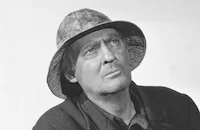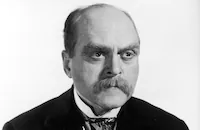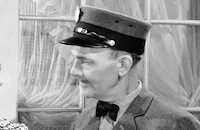The Penalty

Brief Synopsis
Cast & Crew
Harold S. Bucquet
Edward Arnold
Lionel Barrymore
Marsha Hunt
Robert Sterling
Gene Reynolds
Film Details
Technical Specs

Synopsis
Posing as a logging boss in a small Midwestern town, shrewd bank robber Martin "Stuff" Nelson tricks some itinerant workers into accompanying him to a bank. As the men innocently wait, Stuff gets away with thousands of dollars by convincing the teller that the men are his gang. He later gets out of the area by posing as a chauffeur and receiving valuable information on a shortwave radio. Government agents Craig and Brock are put on the case and are determined to catch the wily Stuff, who manages to elude the police by relying on help and information from a large network of contacts. Stuff soon meets his son Roosty and his girl friend Julie, who have been waiting in a hotel. The police know who they are and keep a close watch on Julie, who is loyal, but careless. While Roosty and Stuff get away for a vacation and flying lessons, Julie returns to a New York apartment, where they soon meet her. Because she has a known weakness for buying a particular candy, Craig and Brock are able to find her and raid her apartment. Stuff is now involved in another robbery, and Craig and Brock try to get Roosty to talk, but he gives them the wrong bank name and Stuff is able to get Roosty away after killing Brock. The police eventually find their cabin hideaway and during the shootout, Julie is killed and Stuff is wounded. Stuff and Roosty escape, but separate after Stuff tells his son to contact him through a certain address. Roosty is captured and sent to reform school, but several weeks later is sent to live with Edward McCormick, a young man who lives with his mother on a farm near Indianapolis. Ted tells Roosty that he is taking him in only for the $21-a-month stipend which his farm desperately needs, but does not reveal that police are trying to set the boy up to trap his father. At first Roosty hates the "hicks" he meets, but soon grows fond of Ed and "Ma." He becomes particularly attached to the family of Ed's girl friend, schoolteacher Katherine Logan, whom Ed cannot marry because he has no money and the state forbids employment of married women teachers. After Roosty secretly returns some money that Katherine's grandfather knows he has stolen, Grandpa takes the boy under his wing. Some weeks later, Roosty has come to enjoy farm life and admire the strict, but kind Ed. On the day that Roosty reads a coded personal ad that Stuff had placed in an Indianapolis newspaper, he overhears Ed talking on the phone with Craig, who says that Stuff will be coming soon. Despite his disappointment in Ed, when Stuff arrives, posing as a crop duster, Roosty refuses to leave. Just then Grandpa arrives and, realizing the situation, gets an old gun and tells Stuff to leave Roosty alone. Enraged, Stuff shoots Grandpa, then Roosty takes Grandpa's gun and tells his father to leave. Outside, government agents are waiting for Stuff and he is killed. Despite his grief, Roosty is happy that Grandpa is only wounded and that he will be able to remain with Ed and Ma.

Director

Harold S. Bucquet
Cast

Edward Arnold

Lionel Barrymore

Marsha Hunt

Robert Sterling

Gene Reynolds
Emma Dunn

Veda Ann Borg

Richard Lane

Gloria Dehaven

Grant Mitchell

Phil Silvers
Warren Ashe
William Haade
Ralph Byrd
Edgar Barrier
Al Hill

John A. Butler
Don Rowan
Joe Devlin
Gus Schilling

Byron Foulger
Ken Christy
Mimi Doyle
Tim Ryan
Charles Wagenheim
William Tannen
George Lynn
Bill Lally
Alonzo Price
Crew
Jack Chertok
Clyde De Vinna
Randall Duell
Cedric Gibbons
John C. Higgins
Charles Lawton
Harold Rosson
Harry Ruskin
William Ryan
Douglas Shearer
David Snell
Dolly Tree
Edwin B. Willis
Ralph Winters

Film Details
Technical Specs

Quotes
Trivia
The New York production of the play "Roost" opened 14 February 1938 and closed after 8 performances.
Notes
The working title of the film was Roosty. According to Hollywood Reporter news items, Virginia Grey was initially considered for the role that went to Marsha Hunt. Hollywood Reporter production charts include Fay Holden in the cast, but she was neither in the viewed print nor mentioned in reviews, and it is likely that her part was cut before the press preview. Clyde De Vinna was listed as the cameraman on all production charts; however, only Harold Rosson is credited with photography on the film. News items note that portions of the picture were filmed on location in Sherwood Forest, CA. The farm sequences were partially filmed in Inglewood, CA. This was Robert Sterling's first film under contract to M-G-M, and the first feature produced by Jack Chertok, who had formerly been with the studio's shorts department. According to records of the OWI, The Penalty was "disapproved for all export" in July 1943 by Watterson R. Rothacker, Chairman of the Los Angeles Board of Review of The Office of Censorship, because "it is lawless throughout, with killings, juvenile delinquency, and other undesireable features."













